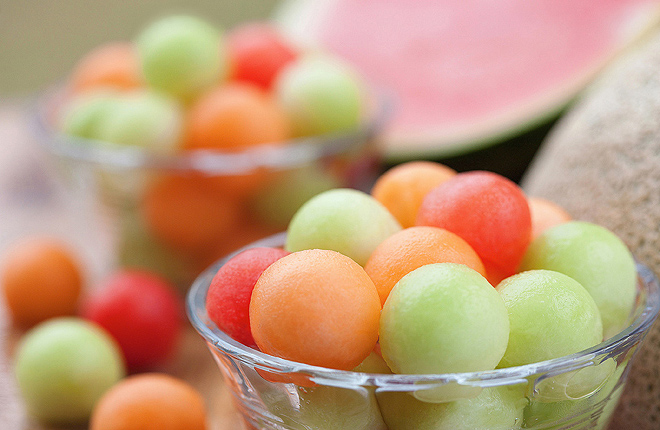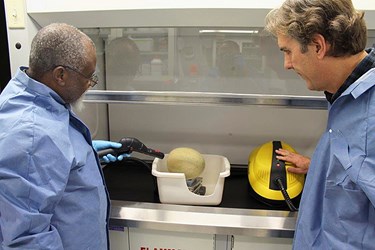Steam Makes Melons Safer
An Agricultural Research Service (ARS) scientist in Wyndmoor, Pennsylvania, has shown that a relatively inexpensive steam-cleaner – designed to remove wallpaper and clean outdoor grills, kitchen counters, and other household surfaces – can rid cantaloupes, and possibly other produce, of Escherichia coli, Salmonella, and Listeria more effectively than existing washes and chlorine treatments.
The technology could reduce the number of cases of foodborne outbreaks from contaminated produce, which each year cause an estimated 1.2 million illnesses, 7,100 hospitalizations, and 134 deaths. They also generate $1.4 billion in illness-related costs, according to the U.S. Centers for Disease Control and Prevention.
|
|
Dike Ukuku and his colleagues at the ARS Food Safety and Intervention Technologies Unit in Wyndmoor submersed 24 cantaloupes in a bath inoculated with E. coli, Salmonella, and Listeria strains, then dried and refrigerated them at 41 °F for 7 days. They then used a commercially available power steamer to steam-clean the cantaloupes by sweeping the spray nozzle across the fruit for 3 minutes. They placed the nozzle 3 inches from the cantaloupe, a distance that produced 154 °F steam at the point of contact. That temperature was hot enough to kill surface pathogens but not damage the fruit. They used a 915 Wagner Power Steamer, but any steamer generating the same heat would likely produce similar results.
Some cantaloupe were cut up immediately after being steamed. Others were stored for 7 days at 41 °F and then cut up.
The results showed that the steam treatment was effective at killing the pathogens. Pathogen levels were generally 1,000 times lower on the surfaces of steam-treated melons (99.9% reduction) and were undetectable on the cut-up pieces. Surface pathogen levels were about 100 times lower than those found on cantaloupes sanitized with chlorine.
The cut-up melon pieces showed no undue softening, discoloration, or unwanted odors, either right after the treatment or up to 7 days later. The researchers refrigerated treated melons for 29 days to check for abnormal ripening, decay, and defects but found none.
The technique may also be used to sanitize watermelons, honeydew melons, cucumbers and baby carrots, Ukuku says.
Ukuku realizes that consumers are unlikely to start “steam-cleaning” their produce, but his work shows that the technique could be used to sanitize produce without significantly adding to food processing costs. Processors and distributors could apply steam when cantaloupes are put into washers or as they pass along on conveyor belts during processing, Ukuku says.
The research appeared in the International Journal of Food Microbiology in 2016.—By Dennis O'Brien, ARS Office of Communications.
Key Facts
- Foodborne illnesses from contaminated produce sicken 1.2 million people each year in the United States.
- Study shows that steam-treating cantaloupes can reduce pathogens.
- Technology is simple and could be adapted for other produce.
Full Story








